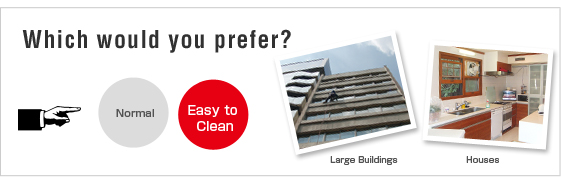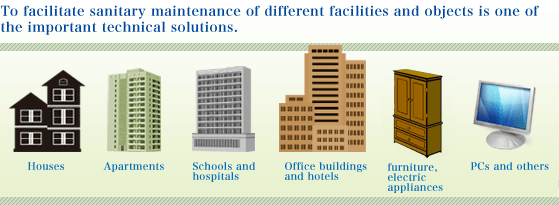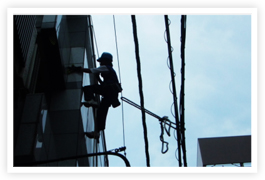Easy maintenance is a valuable feature

I have been engaged in sanitary maintenance for more than 15 years. From the experience of cleaning diverse objects from buildings to houses, from home electric equipments to furniture, I have realized that some are hard to clean while others are easy.
Moreover, the long list of the service menu of cleaning providers corresponds to the needs of clients, which signifies people are facing variety of problems concerning sanitary maintenance.
The trend is from maintenance after production to production that incorporates maintenance. This is what the market demands and also what cleaners want.
The Clean Producer Teruo Ueki has invented the “Equation of Cleaning” and also “Ueki’s Law to Make Cleaning Easier.” With these concepts, Ueki proposes creative ideas to make sanitary maintenance of different objects easy and generate new added value.
An Easy-to-clean Home is a Healthy Home
Many people have interests in making cleaning easy. It is said that more than 80% of Japanese do cleaning by themselves. What is the situation in your country?
One of the concerns shared worldwide is allergy.
In some cases, cleaning can improve the allergic symptoms by removing causes of aspiration allergy such as dust, ticks, mold, pet hair, pollens, etc.
To take pets for example, many urban residents keep pets inside the house.
20% of US population is estimated to have cat allergy and close to 10 million people live with cats even though they have cat allergy, according to American Academy of Allergy Asthma and Immunology (AAAAI).
The cause of allergy is considered to be protein contained in cats’ saliva and dander. Since allergens are ethereal, they float in the air and attach to the surface of walls, furniture, electrical appliances, carpets, clothes, etc.
Many pet owners have trouble with cleaning these. Therefore, making cleaning easy will greatly improve the living conditions of these people.
Making cleaning easy thus not only lightens the burden of housework but also creates a “healthy home.”

The Clean Producer can facilitate the sanitary maintenance of houses, apartments, office buildings, commercial facilities, public facilities, furniture, electric appliances and others.
![]()
Material
Building Cleaning Technician Examinations
http://www.j-bma.or.jp/jbma_eng/business/index.html
Building Sanitation Engineer
INTRODUCTION
The “Law for Maintenance of Sanitation in Buildings” (hereinafter simply called “Building Sanitation Law”) will soon reach its fortieth anniversary after it was enacted in 1970. During all these years, the socioeconomic environments around buildings because of soaring land prices and remarkable progress of techniques for building sanitation management , among other thing.
Under these circumstances, maintenance of a fine environment in modern buildings is of growing importance for enriched, civilized life of peopic working or living in modern buildings .
Pursuant to the Buildings Sanitation Law, the“Building Sanitation Management Standards” were prepared, setting forth measures necessary to maintain hygienically fine environments within buildings, so on. “Building sanitation engineers” are responsible for supervising maintenance of sanitation within building properly in accordance with these standards.
In view of the importance of enhancement of the abilities of businesses of building sanitation management for a rise of the building sanitation level , a system for registration of building cleaning businesses and other building maintenance businesses by prefectural governors was initiated in 1980, and this system prescribes certain human and physical requirements.
In 2001, the business of air conditioning duct for buildings was added to the scope of businesses covered by the said registration system. As a result of this change, the definition of air, water supply and building sanitation maintenance was modified to additionally cover “control of air, water supply and drainage” and the term “business of building sanitation maintenance” was changed into “businesses of building sanitation general management”. At the same time, the Building Sanitation Law was amended to include a provision that the Ministry of Health, Labour and Welfare may prepare Ministerial Ordinances setting forth the requirements for registration with the said system except for human and physical requirements.
The Foundation for Building Management Education Center (BMEC) operates under the Building Sanitation Law to develop building sanitation engineers and other technicians and to conduct research and surveys into sanitation within buildings. Established in 1970,simultaneousy with the enforcement of this law, the center is a public-service corporation authorized by Minister of Health, Labour and Welfare.
This booklet outlines the centers training programs and describes the Building Sanitation Law.
January, 2007
Katsumi Meguro. M.D
Director, Foundation for Building Management Education Center (BMEC)
Lectures for Supervisors of Cleaning Businesses registered with MHL W
Details of lectures
Lectures for Building Sanitation Engineers registered with MHLW
This series of lectures is now being held in permanent lecture halls in Tokyo and Osaka and, through the cooperation of operating associations composed of representatives of the Building Owners and Managers Association and Japan Building Maintenance Association (from fiscal 1973, operating committees), provisionally in other areas.
Lectures for Supervisors of Cleaning Businesses registered with MHLW
Building cleaning businesses involve cleaning of building floors and inside walls. Businesses involving only cleaning of building windows, outer walls or water supply drainage equipment are not covered by the registration system under the current law (businesses involving cleaning of tanks for potable water can be registered in the category of building potable water tank cleaning businesses) Businesses engaged in air environment measurement and simplified water quality tests (check for residual chlorine, etc.) in addition to cleaning may be registered as building sanitation general management businesses (of course, if they satisfy the requirements for registration in this category).
Lectures for Persons Conducting Measurement of Air Quality registered with MHLW
This series of lectures covers building air measurement businesses. Item of air measurement are: (1) suspended particles, (2) carbon monoxide, (3) carbon dioxide, (4) temperature, (5) relative humidity, (6) air flow and (7)formaldchydc.
Lectures for Duct Cleaning Supervisors registered with MHLW
Building air conditioning duct cleaning businesses pertain to cleaning of the air conditioning ducts in buildings. This series of lectures is intended to help individuals, who desire to get a license of duct cleaning supervisor (one of the requirements for registration of building air conditioning duct cleaning businesses), acquire knowledge and skill needed for this license.
Lectures for Potable Water Tank Cleaning Supervisor registered with MHLW
This series of lectures covers the cleaning of water receivers, overhead water tanks, and other facilities for the supply of potable water in building. It does not cover the cleaning of water for industrial use.

